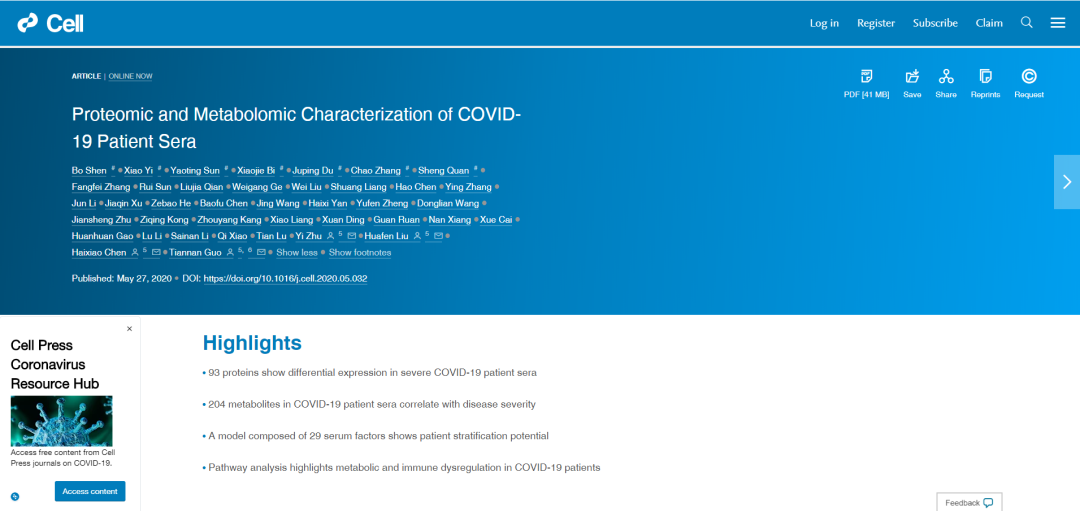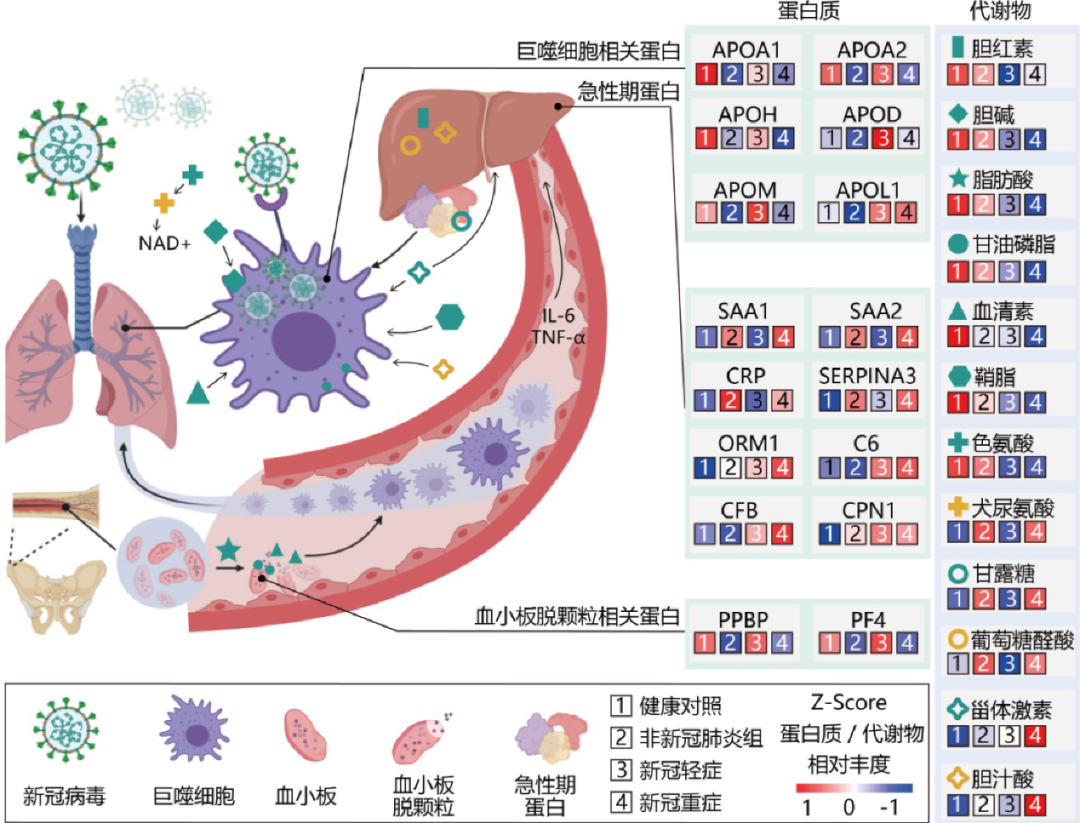
On May 28, 2020 (BJT), Cell (impact factor: 36.216), a well-known journal in biomedical research field, published online the result of a research co-completed by Calibra Laboratory of DIAN Diagnostics, Taizhou Hospital of Zhejiang Province and Guo Tiannan Laboratory of West Lake University.
Funded by Tencent Foundation, this research analyzed the metabolites and protein molecules in the serum of patients with COVID-19 by combining the technical advantages of metabonomics and proteomics, and found the presence of multiple unique molecular changes in the serum of patients in severe conditions and a series of potential biomarkers, which was expected to provide reference and basis for predicting the risk of patients turning from mild symptoms to severe conditions.

Proteomic and Metabolomic Characterization of COVID-19 Patient Sera
https://www.cell.com/cell/fulltext/S0092-8674(20)30627-9
Copy the link to view the original paper
As the co-first author and co-corresponding author, Calibra Laboratory of DIAN Diagnostics participated in the whole process of the experimental design, data analysis and paper writing of this research, and mainly undertook the metabonomics detection and analysis.
The research team made a prompt response to the difficulty of patients in severe conditions to be diagnosed at an early stage
With the worldwide outbreak of COVID-19 for several months, the number of infected people exceeded 1 million. From January to February this year, the number of infected people in Taizhou, Zhejiang Province, increased dramatically due to the large flow of people. As a designated hospital for treatment of COVID-19 in Taizhou, Taizhou Hospital’s team found that the differentiation of mild and severe patients was often conducted relying on the clinical experience of doctors, lack of sensitive predictors, and that patients in severe conditions might have already developed to the late stage of the disease at the time of diagnosis, thus being quite critical. In consequence, whether or not critical biomarkers could be found was of great importance to detect the progress from mild to severe conditions at early time.
The research team of Taizhou Hospital, the Calibra research team of DIAN Diagnostics, and the Guo Tiannan research team of West Lake University completed the experimental design, detection and data processing in a short time. The experimental design group was consisted of the group of patients with severe COVID-19, the group of patients with general COVID-19, the healthy control group and the ill control group. With the help of the high-resolution mass spectrometer, the research team conducted a panoramic determination of metabolites and proteins in serum samples, obtained the metabonomics and proteome spectra of the samples, and revealed a variety of unique molecular regulatory mechanisms in critically ill patients.
On the basis of analyzing data with mass spectrometry, the research team further classified the samples in training set and validation set using the machine-learning algorithms, and further verified it by analyzing the targeted metabolic spectrum and protein spectrum.
Combined use of multiomics technologies to reveal the critical difference between patients with mild COVID-19 and with severe COVID-19
Through the metabonomics analysis, the Calibra research team and collaborative team of DIAN Diagnostics identified 941 metabolites in serum, among which 373 metabolites changed significantly in patients with COVID-19, and 204 metabolites with characteristic changes were related to the severity of the disease.
As observed by the research team, more than 100 lipid molecules were down regulated in critically ill patients. The further analysis suggested it might be related to the abnormal liver metabolism of the patients, which was consistent with the clinical findings of abnormal bilirubin and bile acid;
11 steroid hormones were significantly up-regulated, suggesting that it promoted the formation and activity of macrophages and other immune cells, which might be related to the protection mechanism triggered by infection of the disease;
Moreover, the serum amino acid metabolic pathway was significantly inhibited in patients with COVID-19, and more than 100 amino acids were significantly down regulated, including over 10 metabolites of arginine metabolism, which suggested an abnormal liver function. This was probably the consumption caused by the rapid amplification of the virus, providing a certain reference for clinicians to monitor the development of the disease and formulate and adjust the therapy.
In addition, compared with the healthy control group, the ill control group and the group of patients with general COVID-19, the samples from patients with severe COVID-19 showed 93 unique protein expressions, of which 50 proteins were related to macrophages, platelet degranulation and complement system.

The functional pathway of macrophages, platelets and complement system in critically ill patients infected by COVID-19 was speculated as the figure according to the omics data. These proteins and metabolites were expected to be biomarkers and therapeutic targets for early diagnosis of severe patients.
In the process of the further data analysis, the research team further screened from the samples in training set 22 proteins and 7 metobolities that the severe patients were characterized by, applying the machine learning algorithms, and successfully identified the type of 16 patients from 19 new patients using targeted protein and metabolic profiling.
This research suggested that changes in protein and metabolic levels could be used as potential biomarkers to assess the severity of the disease, and patients with serum sample composition consistent with this combination were likely to be severe patients, or had a high probability of developing into severe cases. This finding was expected to be used in the prediction of critically ill patients to promote the reasonable allocation of medical resources, and provide certain guidance for the drug selection of critically ill patients. However, the result still required to be verified in more independent clinical cohorts in the future.
Interdisciplinary technology shows its power to contribute to the victory in fighting against COVID-19
Starting in February this year and applying new mass spectrometry detection technology and machine learning algorithms, this study integrated the multidisciplinary data including metabolomics, proteomics, clinic, biology and computing in a short time, and completed for the first time the metabonomics and proteome analysis of the serum from patients with mild and severe COVID-19 upon repeated screening, analysis, comparison and validation, which provided a panoramic description of the unique and presently unclear molecular pathological changes in the serum of patients with COVID-19.

Calibra research team at work
In the following days, research teams of DIAN Diagnostics including Calibra laboratory will continue to give full play to their own strengths to assist hospitals and institutions in various regions of China in carrying out research, detection and drug therapy evaluation of COVID-19, so as to help discover the law of the disease and provide more help to overcome the epidemic.


